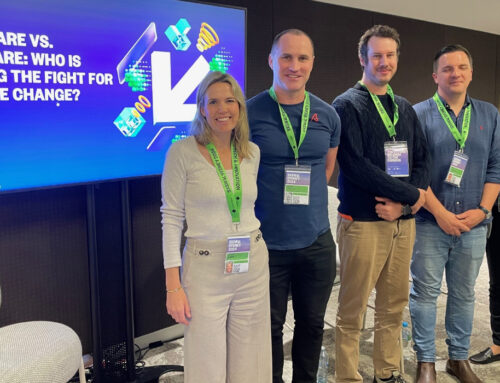Imagine for a moment that you suffered from a health condition that caused you such physical and physiological distress you missed up to 23 days of work or school each year, for years on end. Then imagine there was a simple, non-invasive medical device that could help alleviate those symptoms, drug-free.
Despite advances in medical technology women and adolescents still lose cumulative weeks of their everyday activities because of the physical and physiological symptoms experienced as a result of their period.
It no longer has to be that way. For the past two years London-based med-tech company Samphire Neuroscience has been building on three decades of tested and approved neurotechnology to create a ground-breaking device that will give either full relief from or drastically reduce the pain and menstrual cycle-driven mental health side-effects experienced by many, many women globally.
FireBand by Samphire is a simple dual headband worn for around 20 minutes a day in the five days leading up to a woman’s period. Operated wirelessly on your phone through a mobile app, it uses a non-invasive low-current electrical pulse to stimulate certain parts of the brain that control pain sensitivity and helps restore balanced brain connectivity that can become disrupted during the premenstrual period. It aims to quickly and effectively alleviate physical symptoms such as cramping and physiological symptoms ranging from low mood to irritability and cravings.
“We want to create the first solution that addresses both the cognitive and pain challenges of periods,” says Emilė Radytė, Samphire’s CEO and co-founder. “Menstrual mental health has been extremely neglected so even though there are solutions for menstrual pain .. a lot of the aspects that make women most distressed and most debilitated are the mental health aspects.”
Born in Lithuania, Radytė, was studying neuroscience and anthropology at Harvard University when she began working as a paramedic, leading a team of 90 paramedics at the university’s student-led medical service. She was exposed first-hand to emergency situations and shocked to discover that, rather than the burns or broken limbs she anticipated, more than half the call-outs were people experiencing psychological distress. More often than not she felt ill-equipped to help.
“When it’s a mind disturbance and someone is really sad there’s literally nothing you can do,” she says. “That’s the thing that really drove me to study psychiatry.”
After graduating she studied a Master of Science and Doctor of Philosophy in neurobiology and neurosciences at the University of Oxford, researching novel methods of brain stimulation to treat depression. As she got further into her research Radytė realised many of the symptoms her patients described were similar to what she experienced monthly.
“I always knew I had pretty extreme PMS [premenstrual syndrome] but hadn’t identified the similarities between the symptoms,” she says. “That was a wake-up call.”
Suspecting PMDD (premenstrual dysphoria disorder, a severe form of PMS) she investigated further. “It got super interesting because it’s the only predictable mental health disorder we know. Others I’ve since discovered are post-partum or peri-menopausal depression, all of them centring around transitions of hormonal states in women and all very poorly understood,” she says. “I know the mechanisms of depression well and [period-related depression] is something predictable which means if you can foresee it, you can potentially mitigate it before it happens. That was the first insight.”
She began discussing her ideas with fellow Oxford student and Australian lawyer Alex Cook, who was studying a Master of Law and Finance. Cook had impressive experience in product development and regulation, having been a founding member of Perth-based fintech start-up Bamboo before working in IP and technology law with Herbert Smith Freehills after Bamboo listed. Together, the pair believed their complementary skills and experience could combine to devise a game-changing solution for women who suffered PMS, PMDD and other debilitating symptoms.
In August 2021 they built their first basic prototype and by October had raised their first round from HAX/SOSV who gave them invaluable access to engineers and supply chain. Today the team is five-strong in addition to various clinicians who are an integral part of the research and development. Since that first prototype Samphire has devised more than 100 iterations of the device ensuring increased safety and incorporating women’s feedback from multiple global trials.
“We wanted it to be made for women by women” says Radytė.
Over the past two years regular usability and clinical trials have been conducted in the UK and Brazil respectively and in May this year the device went through the design for manufacturing process. The team is currently completing the rigorous regulatory process and aiming for the FireBand to formally launch in the EU and US in early 2024 with a soft launch in December for women of highest need (who are waitlisted on the site). The device will then be rolled out in Australia and Canada with the rest of the world to follow.
An extremely high-quality product, the device is also cost-effective. If used for just five years it costs under USD10/month, with most users menstruating for many more years than that. Nevertheless Radytė is confident the cost will ultimately be supported by the healthcare system.
Scandalously, treatment for PMS and its 127-plus associated symptoms is still almost non-existent beyond pain medication and TENS (a machine that delivers generic pain relief through electrical currents), none of which address the mental health symptoms of menstruation, despite so many women experiencing it.
“Because of the way we talk about PMS and periods it’s extremely stigmatised and isn’t often acknowledged as a reason to miss work, which causes a lot of problems for people,” says Radytė. “There are alternatives for managing pain, such as painkillers, but for cognitive [health] we believe we’re the first medical grade solution.”
The team is already working on additional features for the device, such as options for meditation or exercise while wearing the device; and researching an education campaign for gynaecologists, who are typically not trained in psychiatry or neurology. Work is also well underway on Samphire’s next product, focussed on alleviating symptoms of menopause.
“We really believe mental health at all levels of hormonal transition for women has been neglected,” Radytė says. “We’re trying to let women live their lives to the fullest, regardless of the phase they’re in.”






